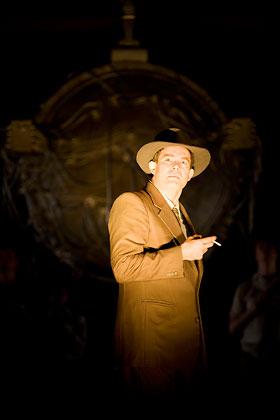
The Metropolitan Opera has recently started making its operas available in movie theatres across the continent. You pay about $25, settle into your seat in the movie theatre, and the show is broadcast live in HD. I'd heard about the idea, and I'd heard that it was surprisingly satisfying, if a little weird that it makes you feel like you should be applauding in a movie theatre.
Now, I'm not an opera connoisseur, or even an opera fan for that matter. But I've heard far too much about John Adams's opera Doctor Atomic not to be really intrigued by it. I'd read a couple of reviews of different productions, and even gone out on YouTube to find some arias. What I found was strange and edgy and gorgeous. It’s an opera about J. Robert Oppenheimer and the development of the atomic bomb: sort of an analogue of Faust, in which a brilliant scientist sells his soul to the devil for knowledge.
Anyway, a friend of mine noticed a couple of days ago that two theatres in town were going to be showing encore presentations of Doctor Atomic. So he and I and a third friend headed off to Silver City yesterday to go to the opera. It was a little strange; we were probably the three youngest people in the room, with the exception of two children there with their parents. The three of us are certainly not your stereotypical opera crowd - more like fans of comic books, SF, anime and videogames. But this is opera about physicists and the technology and tactics of war. And the Manhattan Project. Right up our alley, really.
It’s interesting how you have to get your mind into the space to listen to a new art form. At the start, you’re off balance a little, not sure how you’re supposed to relate to this story. It’s stylized, staged, and everyone’s singing their lines. Including lines about “blisters on the hemispheres of the plutonium core” (the dialogue lines were apparently taken from reports and memos from the Manhattan Project, and really didn't sound like the kind of thing that could be easily sung.) But eventually you get into it - especially with Gerald Finley’s gorgeous performance. He has a stunning voice, and the perfect face to portray Oppenheimer … all he has to do is close his eyes slowly to project that sensitivity and conflict.
I have one problem with the HD broadcast. (I was even okay with the fact that the cameras were so close a lot of the time that you could see spit on the singers’ chins, and a little less okay with not being able to see the full stage when it was clear other things were happening with the massive set.) My problem was that it didn’t really know that it didn’t want to be TV. The whole thing was hosted by a blonde with a mike, who walked around backstage introducing the story before the performance. I’d love to be able to walk around backstage at the Met, but not when I’m about to watch an opera. I don’t want to see the levers and strings, I want to see the illusion on stage. Let me see the levers and strings when I’m not there as the audience, waiting to suspend my disbelief.
And when Finley closed out the first act with the best aria in the whole opera, a setting of Donne’s “Batter my heart, three-person’d God,” and the orchestra’s crashed to the apocalyptic chord the act ends on… I wanted to have a moment of silence. I wanted to be able to rest for a minute and reflect. It’s a very powerful piece of music, and I wanted to take a deep breath and say, “Wow.” Instead, the camera cut straight to the blonde, backstage, cornering Finley as he came off stage (still wiping his forehead) and yammering on about how he gets inside Oppenheimer’s character and what’s it like to be able to sing this gorgeous music. It completely killed the buzz. Even if the little mini-documentary they put together about what happened to Oppenheimer after the Manhattan Project was kind of interesting, and the interview with John Adams might have explained some things about the libretto that I knew my two friends wouldn’t have known. Still. I didn’t want to have the illusions broken.I didn't want to see Finley when he wasn't being Oppenheimer. I wasn’t even, at that point, concerned with who Oppenheimer really was: he was the tragic hero of an opera. For that purpose, it was almost better for me to forget he was a real person and focus on the grandiose themes of sin and redemption and science and knowledge that the opera’s about. Let him be a myth for three hours or so.
Other than the infomercial for the Met and the annoying host, though, it was actually a cool experience. I got to see an opera, which I normally wouldn't; and it made me think that if I were in New York I might actually drop the $50-$80 to get half decent seats and go see it again. So, a non-opera-goer, and possibly two of her friends, partially converted. I guess the HD broadcast did its job.
Especially since if I went to see it live, I'd be able to sit still with myself and take a long breath during the intermission.

